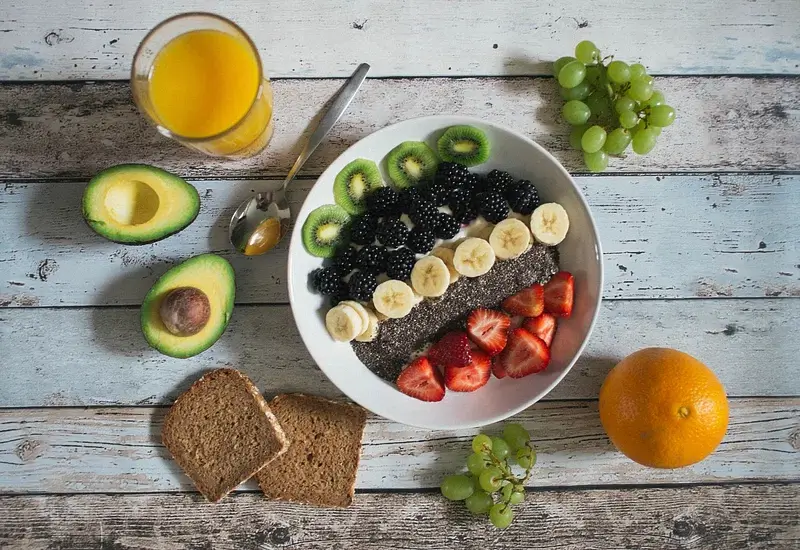Cholesterol-lowering foods,” “plant-based diet,” “HDL cholesterol,” and “heart-healthy tips.”
Cholesterol. It’s a word whispered ominously by doctors, splashed across headlines, and lurking in the nutritional shadows of our favorite treats. But what exactly is it, and why should we care? Buckle up, health detectives, because we’re about to crack the cholesterol code, unveil the dietary culprits, and empower you to craft a delicious and heart-healthy plate.
Contents
- 1 The Cholesterol Chronicles: Friend or Foe?
- 2 The Sneaky Suspects: Unmasking the Unhealthy Fat Gang
- 3 The Domino Effect: Unraveling the Consequences of Unhealthy Fats
- 4 Cracking the Code: Swapping Villains for Heroes
- 5 Beyond the Bite: A Holistic Approach to Cholesterol Health
- 6 The Great Cholesterol Caper: From Culprits to Champions .
- 6.1 The Power of Plants: Nature’s Cholesterol-Lowering Arsenal
- 6.2 Spice Up Your Life: Flavorful Cholesterol-Lowering Twists
- 6.3 Unleashing the Recipe for Success: Putting it All Together
- 6.4 Remember, cholesterol management is a team effort. Here are some additional tips for a heart-healthy lifestyle:
The Cholesterol Chronicles: Friend or Foe?
Cholesterol, a waxy, fat-like substance, plays a vital role in our bodies, building cell membranes, aiding hormone production, and supporting digestion. However, too much of a good thing can turn sour. There are two main types of cholesterol:
- LDL (Low-Density Lipoprotein) cholesterol: The “bad guy,” responsible for building up in artery walls and increasing the risk of heart disease and stroke.
- HDL (High-Density Lipoprotein) cholesterol: The “good guy,” transporting LDL cholesterol away from arteries and protecting against heart disease.
The Sneaky Suspects: Unmasking the Unhealthy Fat Gang
While our bodies naturally produce cholesterol, dietary intake plays a significant role in our blood levels. The real villains hiding in our kitchens are saturated and trans fats, found in abundance in these delectable (but dangerous) dishes:
- Fatty meats and deli meats: Think marbled steaks, sausages, and salami – a haven for saturated fat.
- Full-fat dairy: Butter, cheese, cream, and whole milk – delicious, but saturated fat-laden.
- Fried foods: Crispy fries, onion rings, and fried chicken – tempting, but a double whammy of saturated and trans fats.
- Baked goods and sweets: Pastries, cookies, cakes, and doughnuts – sugary and bursting with trans fats.
- Tropical oils: Coconut and palm oil – while touted as healthy, they’re high in saturated fat.
- Processed foods: Frozen meals, snacks, and packaged baked goods – often laced with hidden trans fats.
The Domino Effect: Unraveling the Consequences of Unhealthy Fats
High cholesterol isn’t just a number on a blood test; it’s a ticking time bomb in your arteries. Here’s how unhealthy fats unleash their havoc:
- Artery Clogging: LDL cholesterol accumulates, narrowing arteries and restricting blood flow, leading to heart attacks and strokes.
- Diabetes Dance: Unhealthy fats disrupt insulin sensitivity, raising blood sugar and increasing the risk of type 2 diabetes.
- Weight Woes: Excess fat intake contributes to weight gain and obesity, further burdening the cardiovascular system.
- Inflammation Frenzy: Chronic inflammation, linked to various health problems, can be triggered by excessive unhealthy fats.
- Mind Maze: Research suggests a link between unhealthy fat intake and increased risk of Alzheimer’s disease and dementia.
Cracking the Code: Swapping Villains for Heroes
The good news is, you hold the pen in your culinary story! Here’s how to rewrite your script with healthier alternatives:
- Protein Power Play: Choose lean protein sources like chicken breast, fish, and beans over fatty meats.
- Dairy Delights: Embrace low-fat and fat-free dairy options like skim milk, low-fat yogurt, and light cheeses.
- Cooking Capers: Ditch the deep fryer and embrace grilling, baking, steaming, and poaching for healthier cooking methods.
- Fat-tastic Swaps: Replace butter with olive oil or avocado oil. Opt for nuts and seeds as a healthier source of fat.
- Label Detective: Scrutinize ingredient lists for “partially hydrogenated oils” and “hydrogenated vegetable oil” – the telltale signs of trans fats.
- Portion Perfection: Savor smaller portions of less-healthy indulgences and fill your plate with nutrient-rich fruits and vegetables.
Beyond the Bite: A Holistic Approach to Cholesterol Health

A healthy lifestyle is the ultimate cholesterol-fighting weapon. Combine mindful eating with these practices:
- Move Your Body: Regular physical activity strengthens your heart and helps manage cholesterol levels. Aim for at least 150 minutes of moderate-intensity exercise per week.
- Sleep for Success: Adequate sleep (7-8 hours per night) helps regulate hormones and improves overall health, including cholesterol levels.
- Stress Less, Live More: Chronic stress can raise cortisol levels, which contribute to high cholesterol. Manage stress through relaxation techniques like yoga, meditation, or spending time in nature.
The Great Cholesterol Caper: From Culprits to Champions .
The Power of Plants: Nature’s Cholesterol-Lowering Arsenal
Mother Nature knows a thing or two about health, and her plant kingdom offers a bounty of cholesterol-fighting heroes:
- Fiber Fantastic: Soluble fiber, found in oats, beans, lentils, and vegetables, binds LDL cholesterol and helps flush it out of the body. Imagine it as a tiny broom sweeping your arteries clean!
- Phytosterol Power: These plant-based compounds found in nuts, seeds, and some fruits mimic cholesterol and compete for absorption in the gut, effectively lowering LDL levels.
- Antioxidant All-Stars: Fruits and vegetables bursting with antioxidants like flavonoids and lycopene help combat inflammation and protect against heart disease. Think of them as tiny shields guarding your cardiovascular system.
Spice Up Your Life: Flavorful Cholesterol-Lowering Twists
Who says healthy has to be bland? Herbs and spices add a flavor fiesta to your plate while offering hidden health benefits:
- Garlic Groove: This pungent bulb contains allicin, a compound that lowers LDL cholesterol and blood pressure. Add a dash to sauces, stir-fries, or even sprinkle it on roasted vegetables.
- Turmeric Tango: This vibrant spice boasts curcumin, a powerful anti-inflammatory agent that can improve cholesterol levels and protect against heart disease. Get creative with turmeric lattes, curry dishes, or even scrambled eggs.
- Cinnamon Sweetness: This aromatic spice helps regulate blood sugar and has shown promise in lowering LDL cholesterol. Sprinkle it on oatmeal, yogurt, or even enjoy a warm cup of cinnamon tea.
- Ginger Zing: This versatile root not only adds a fiery kick to your dishes but also helps reduce inflammation and improve cholesterol levels. Try ginger tea, stir-fry it with vegetables, or add it to marinades.
Unleashing the Recipe for Success: Putting it All Together
Now that you’ve met the good guys and bad guys, let’s create a winning recipe for a healthy and delicious plate:
- Breakfast Brilliance: Start your day with oats topped with berries and nuts, or scramble eggs with spinach and tomatoes.
- Lunchtime Legends: Pack a salad with grilled chicken or fish, whole-wheat bread with hummus and vegetables, or a lentil soup brimming with fiber.
- Dinnertime Delights: Opt for baked salmon with roasted vegetables, lentil or bean chili, or tofu stir-fry with brown rice.
Snacks are Not Slackers: Fill your snack cupboard with healthy options like fruits, vegetables, nuts, seeds, and low-fat yogurt. Avoid sugary and processed snacks that are loaded with unhealthy fats.
Don’t forget the fun factor! Experiment with new recipes, explore ethnic cuisines, and enjoy meals with loved ones. Eating healthy should be a pleasurable journey, not a chore.
Making Cholesterol Your Ally: Beyond the Plate

Remember, cholesterol management is a team effort. Here are some additional tips for a heart-healthy lifestyle:
- Quit smoking: Smoking significantly increases your risk of heart disease and stroke. If you need help quitting, talk to your doctor.
- Limit alcohol: Excessive alcohol consumption raises LDL cholesterol and blood pressure. Stick to moderate amounts, like one drink per day for women and two for men.
- Manage stress: Chronic stress can negatively impact your health, including cholesterol levels. Practice relaxation techniques like yoga, meditation, or deep breathing.
- Regular checkups: Get your cholesterol levels checked regularly by your doctor. They can monitor your progress and recommend further steps if needed.
By combining a healthy diet, regular exercise, stress management, and preventive care, you can take control of your cholesterol and pave the way for a longer, healthier life. Remember, you are the chef of your own health, and with the right ingredients and guidance, you can create a delicious and heart-friendly recipe for success.
So, ditch the dietary villains, embrace the cholesterol-fighting champions, and embark on a culinary adventure that nourishes your body and delights your taste buds. Your heart will thank you for it!

